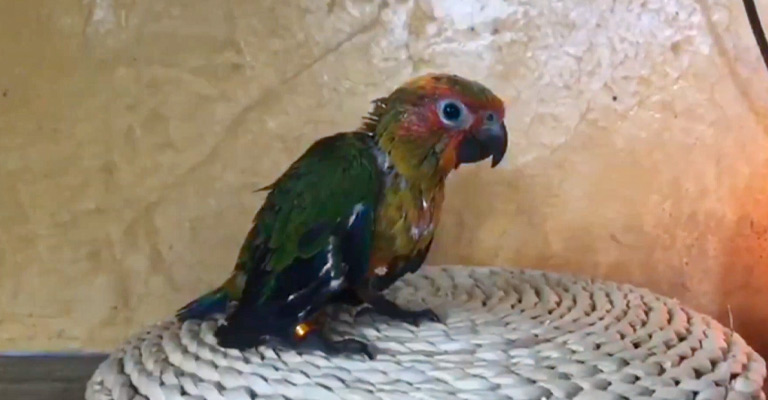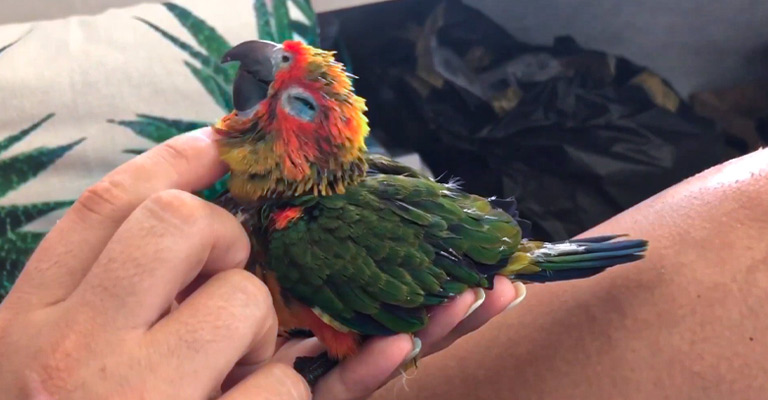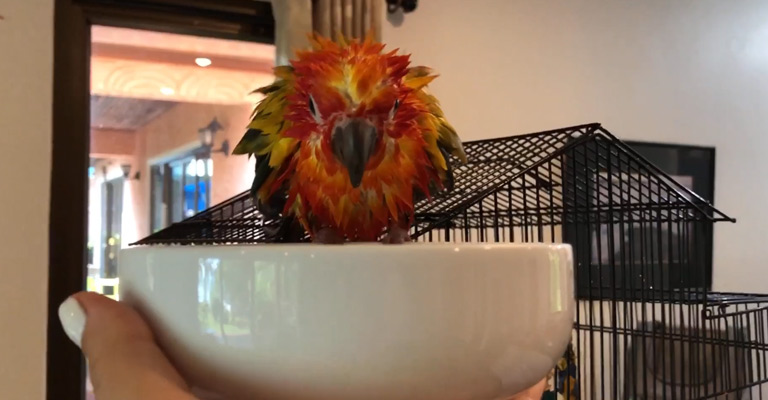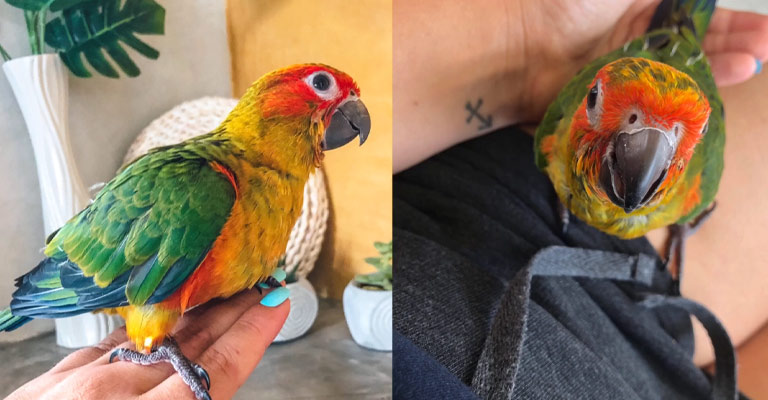Welcome to our comprehensive guide on how to care for baby Conure birds, those vibrant and intelligent feathered companions that bring joy to countless households.
Taking responsibility for a baby’s Conure is an enriching journey, but it demands dedication, knowledge, and a deep understanding of their needs.
In this article, we will delve into the intricacies of raising a healthy and happy baby Conure, covering essential aspects such as proper nutrition, socialization, grooming, and creating a safe environment.
Whether you’re a first-time Conure parent or looking to expand your avian family, these insights will serve as your compass on this remarkable avian adventure.
So, let’s spread our wings and embark on this rewarding journey together, ensuring our baby Conures thrive under our loving care.

Is it Difficult to Take Care of a Baby Conure?
Taking care of a baby Conure can be both rewarding and demanding. While not exceptionally difficult, it requires dedication and knowledge. Baby Conures, like all parrots, need a consistent routine of feeding, social interaction, and mental stimulation.
They thrive on attention and can become stressed if left alone for extended periods. Proper nutrition is crucial, with a balanced diet of pellets, fresh fruits, and vegetables. Maintaining a clean environment is essential to prevent illness.
Baby Conures also requires patience during hand-feeding, as it can be tricky and time-consuming. Additionally, training and socializing them require effort and consistency to ensure they grow up to be well-adjusted, friendly pets.
While not overly challenging, taking care of a baby Conure demands time, effort, and a genuine commitment to their well-being.
How to Take Care of Baby Conure Birds?

Taking care of baby Conure birds requires careful attention, patience, and knowledge. Here’s an elaborate guide to ensure their well-being:
Proper Housing
Start with a spacious and appropriately sized cage. As they grow, you’ll need a larger one. Make sure the cage is made of safe materials and contains perches, toys, and a separate feeding area.
Diet
Baby Conures require a balanced diet rich in nutrients. Commercial Conure pellets, fresh fruits, and vegetables are essential. Avoid avocados and high-fat foods. Babies need frequent feedings, typically every 3-4 hours, and you’ll need to gradually wean them onto solid food.
Hand-Feeding
Hand-feeding is crucial for baby Conures. You’ll need specialized formula, syringes, and guidance from an experienced avian vet or breeder. Warm the formula to an appropriate temperature and feed slowly, allowing the baby to swallow naturally.
Socialization
Conures are social birds and thrive on interaction. Spend quality time with them daily. Gentle handling and positive interactions help them build trust.
Environment
Maintain a clean and safe environment. Clean the cage regularly, remove uneaten food, and provide fresh water daily. Avoid exposing them to drafts, extreme temperatures, or direct sunlight.
Healthcare
Schedule regular check-ups with an avian veterinarian. Keep an eye out for signs of illness, such as changes in behavior, appetite, or droppings.
Weaning
Gradually introduce solid foods as the baby’s Conure matures, but continue hand-feeding until they willingly accept solids.
Training
Begin basic training early, such as teaching them to step up onto your hand or follow simple commands. Positive reinforcement and patience are key.
Toys and Enrichment
Conures are intelligent and need mental stimulation. Provide a variety of toys, puzzles, and activities to keep them engaged.
Grooming
Regularly trim their nails and monitor their beak growth. Seek professional help if necessary.
Noise Management
Conures can be noisy, so be prepared for their vocalizations. Social interaction and mental stimulation can help reduce excessive noise.
Behavioral Training
Consider consulting with a professional bird trainer if your Conure exhibits unwanted behaviors like biting or screaming.
Safety
Ensure that your home is safe for your Conure. Remove toxic plants, secure windows and doors, and be cautious of other pets.
Transition to Adult Diet
As they grow, gradually shift their diet to a balanced mix of pellets, fruits, and veggies. Consult your vet for specific recommendations.
Remember that every Conure is unique, and their care may vary slightly based on species and individual temperament. Always consult with an avian veterinarian or experienced bird breeder for personalized advice and guidance on caring for your baby Conure.
What to Feed a Baby Conure?

Feeding a baby Conure requires careful attention to their nutritional needs. Here’s an elaborate guide on what to feed a baby Conure:
Formula
Baby Conures should be hand-fed with a specialized parrot formula, which you can purchase from pet stores or your avian veterinarian. The formula should be prepared according to the manufacturer’s instructions.
It’s crucial to maintain the formula at an appropriate temperature, usually around 100-105°F (37-40°C). Use a thermometer to ensure it’s not too hot.
Feeding Schedule
Baby Conures need frequent feedings, typically every 3-4 hours during the day. Adjust the schedule as the bird grows and becomes more independent. Be consistent with feeding times.
Feeding Technique
Hand-feeding requires skill and patience. Here’s how to do it:
- Hold the baby Conure gently but securely in one hand.
- Use a small syringe or a specialized feeding spoon to deliver the formula.
- Insert the syringe or spoon into the side of the bird’s beak, not directly down the throat.
- Allow the bird to swallow the food naturally. Don’t force-feed.
- Feed slowly and ensure the baby Conure doesn’t choke.
Amount of Formula
The amount of formula varies with the age and species of the Conure. Younger birds require smaller amounts, gradually increasing as they grow. Consult your avian vet or breeder for specific guidelines.
Weaning
As the baby Conure matures, you’ll need to start introducing solid foods. Begin with softened pellets, fruits, and vegetables. Continue hand-feeding until the bird willingly accepts solids.
Fresh Foods
Offer a variety of fresh foods like apples, pears, grapes, carrots, and leafy greens. Ensure these are clean and pesticide-free. Introduce one new food at a time to monitor for allergies or digestive issues.
Avoid Toxic Foods
Never feed your Conure avocados, chocolate, caffeine, alcohol, or high-fat, sugary, or salty foods. These can be toxic to birds.
Hydration
Provide fresh, clean water in a shallow dish. While hand-feeding, it’s important to monitor the baby’s hydration levels, as they may not drink water until they’re fully weaned.
Calcium
Ensure your baby Conure gets enough calcium, especially for species prone to calcium deficiency. You can provide cuttlebones or mineral blocks.
Consult an Avian Vet
Regularly consult with an avian veterinarian for guidance on the baby Conure’s diet. They can recommend any necessary supplements based on the bird’s health and development.
Monitoring Growth
Keep track of the baby’s weight and overall growth to ensure they are thriving. A sudden weight loss or poor growth may indicate a health issue that needs immediate attention.
Feeding a baby Conure can be a rewarding but delicate process. Ensure that you are well informed and prepared, and always seek guidance from a veterinarian or experienced avian breeder to ensure the health and well-being of your baby Conure.
How to Keep Your Baby Conure Clean and Healthy?

Keeping your baby Conure clean and healthy is essential for their well-being. Here are some tips on how to achieve this:
Proper Nutrition
Feed your baby Ensure a well-balanced diet consisting of high-quality pellets, fresh fruits, and vegetables. Consult with an avian veterinarian or an experienced breeder to ensure you’re meeting their specific dietary requirements.
Hydration
Ensure access to clean, fresh water at all times. Young Conures may not drink water readily, so monitor their hydration, especially while hand-feeding.
Regular Vet Check-ups
Schedule regular check-ups with an avian veterinarian to monitor your cure’s health and address any issues promptly. Early detection can prevent serious illnesses.
Cage Hygiene
Maintain a clean cage by removing waste, and uneaten food, and changing the cage liners regularly. Scrub and disinfect the cage as needed to prevent the buildup of harmful bacteria.
Bathing
Many Conures enjoy bathing. Provide a shallow dish of lukewarm water for them to splash around in. Some Conures might prefer misting with a water spray bottle. Bathing helps keep feathers clean and promotes good hygiene.
Grooming
Regularly trim your Conure’s nails and beak to prevent overgrowth and injuries. Consult with an avian vet or a professional groomer if you’re unsure how to do this safely.
Clean Perches and Toys
Clean and disinfect perches and toys in the cage periodically to prevent the spread of disease. Natural wooden perches can help keep their nails naturally filed.
Social Interaction
Conures are social birds and thrive on interaction. Spending time with your bird not only strengthens your bond but also promotes mental and emotional well-being.
Mental Stimulation
Provide a variety of toys and puzzles to keep your Conure mentally stimulated. This helps prevent boredom and unwanted behaviors.
Noise Management
Conures can be noisy, so consider their environment and the comfort of those around them. Socializing and engaging with your Conure can reduce excessive vocalizations.
Avoid Toxic Substances
Ensure your Conure is not exposed to toxic substances, including cleaning agents, scented candles, or plants that may be harmful to birds.
Quarantine New Birds
If you introduce a new bird into your household, quarantine them in a separate area for several weeks to prevent the spread of diseases.
Monitor Weight and Behavior
Regularly weigh your Conure to track their health. Sudden weight loss, changes in behavior, or signs of illness should prompt immediate veterinary attention.
Limit Stress
Minimize stress factors such as sudden changes in environment or routine. Conures can be sensitive birds, and stress can negatively impact their health.
Flight and Exercise
Allow your Conure daily flight and exercise outside the cage. This helps maintain physical health and promotes mental well-being.
By following these guidelines and providing your baby Conure with proper care, you can help ensure their cleanliness and overall health. Remember that each Conure is unique, so pay attention to their individual needs and preferences to keep them happy and thriving.
Tips to Keep Your Conure Mentally Stimulated
Keeping your Conure mentally stimulated is crucial for their well-being, as these intelligent birds need mental challenges to stay happy and engaged.
Here are seven tips with elaborate explanations to help you provide mental stimulation for your Conure:
Rotate Toys Regularly
Conures can get bored with the same toys, so rotate them regularly to maintain their interest. Offer a variety of toys with different textures, colors, and functions.
Puzzle toys, foraging toys, and toys that encourage shredding are excellent choices. When you introduce a “new” toy by rotating, it can spark curiosity and keep your Conure mentally engaged.
Foraging Opportunities
Conures are natural foragers in the wild, so bring this instinct into their daily lives. Hide treats or pieces of their regular diet inside foraging toys, paper rolls, or cardboard boxes.
This encourages problem-solving and mental stimulation as they figure out how to access the hidden rewards.
Training and Tricks
Conures are highly trainable birds. Teaching them tricks, such as “step up,” “spin,” or “fetch,” provides mental challenges and strengthens your bond. Use positive reinforcement with treats as rewards to make learning fun.
Social Interaction
Conures are social birds that thrive on interaction. Spend quality time with your Conure, talking to them, playing games, and providing attention. This not only keeps them mentally engaged but also satisfies their social needs.
Change in Scenery
Allow your Conure to explore different areas of your home under your supervision. Novel environments stimulate their curiosity and provide new sensory experiences. Make sure these areas are safe and free from hazards.
Music and Audio Stimulation
Conures often enjoy music or the sounds of nature. Playing calming music or recordings of birdsong can provide auditory enrichment. Experiment with different types of music to see which your Conure prefers.
Food Variety and Puzzle Feeders
Offer a variety of foods, textures, and tastes to stimulate your Conure’s palate. Additionally, use puzzle feeders or treat-dispensing toys that require manipulation and problem-solving to access the food. This mimics their natural foraging behaviors and engages their intellect.
Remember to observe your Conure’s preferences and adapt your strategies accordingly. Not all Conjures are the same, so pay attention to which activities and toys your bird enjoys the most.
Consistency and patience are key when implementing these mental stimulation techniques, as it may take time for your Conure to fully engage with these activities. Regularly interacting and providing mental challenges will keep your Conure mentally sharp and content.
FAQs
Feed your baby Conure a specialized parrot formula, gradually transitioning to pellets, fresh fruits, and veggies as they mature. Consult an avian vet or breeder for specific dietary recommendations.
Baby Conures need frequent feedings, typically every 3-4 hours during the day. Adjust the schedule as they grow and become more independent.
Maintain a consistent temperature in their environment, around 80-85°F (27-29°C), and provide a heat source like a heating pad or heat lamp. Monitor their comfort and adjust as needed.
Begin introducing solid gradually when your Conure is around 6-8 weeks old, but continue hand-feeding until they willingly accept solids, which may take several months.
Spend quality time with your baby Conure, handle them gently, and engage in positive interactions. Consistent, patient, and loving socialization is key to building trust and a strong bond with your bird.
Wrapping Up
As we conclude our exploration of nurturing baby Conure birds, we hope this guide has armed you with the knowledge and confidence needed to provide the best possible care for your feathered friend. Remember, raising a baby Conure is both a commitment and a privilege.
By offering proper nutrition, social interaction, a clean environment, and mental stimulation, you’re not just ensuring their physical health but also nurturing their vibrant personalities. These intelligent and affectionate creatures have a unique way of becoming an integral part of your life.
As you watch your baby Conure grow and thrive, the bond you share will deepen, making the effort and care you invest in their well-being more than worthwhile. Here’s to the rewarding journey of caring for your baby Conure and enjoying the vibrant, joyful companionship they bring.